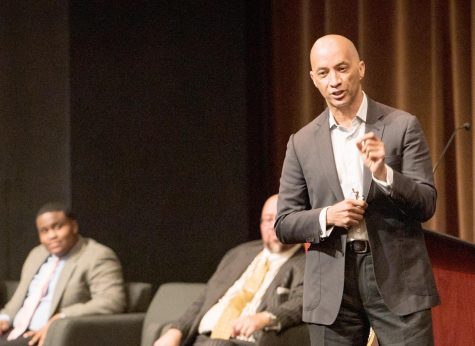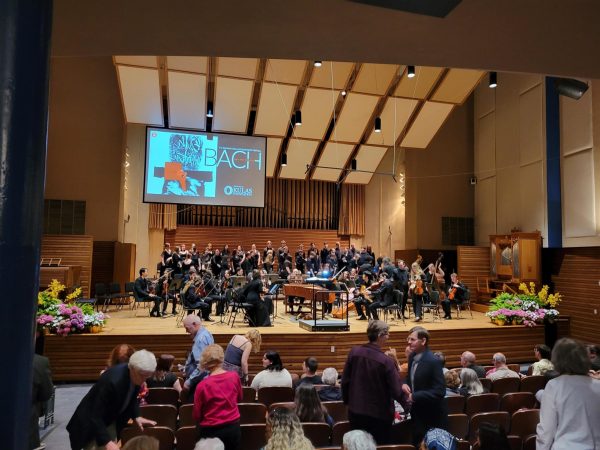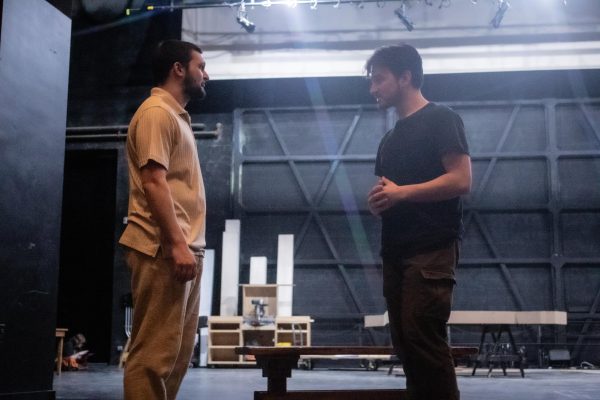ABC news anchor encourages students to ‘live the dream’
Pitts’ talk among 11 events celebrating MLK Week

Byron Pitts spoke with students about privilege and higher education in the world during MLK Week.
Starting his job in October of 1988, Jay Hairston, associate diversity officer and director of the Center for Inclusion, was given the immediate task of finding a speaker for the upcoming Martin Luther King Jr. holiday.
“After about a thirty minute orientation,” said Hairston, “the person I was replacing pulled me aside and said, ‘You have to get a speaker for MLK.’ And I thought, who can I call that I know would be willing to come and that I’ve worked with before? So I called Yolanda King, Dr. King’s oldest daughter.”
Hairston had met King when working at Bowling Green University and Iowa University, both places she had spoken at in the recent past. In January 1989, King spoke at Baldwin Wallace for the annual MLK celebration, marking the beginning of what would evolve into a weeklong event.
29 years later, Hairston’s office is still in charge of finding a keynote speaker, and for the 2019 holiday it was Byron Pitts, co-anchor for ABC’s Nightline. During his speech he spoke about the nature of privilege and higher education, highlighting the disparities between wealth and access to education around the world.
“The next time someone asks you how you’re doing,” Pitts said, “you tell them ‘I’m living the dream.’”
According to Pitts, people who are “living the dream” have a responsibility to make a difference in the lives of those who are not.
In 1989, a single guest speaker was the full extent of the MLK celebration at BW, but that changed when Hairston began to notice a number of events surrounding the holiday happening across the community.
Today, the celebrations at Baldwin Wallace have expanded past the official holiday’s calendar date of January 21st; events both on and off campus occur all week, concluding with the final event on Saturday. From Monday through Saturday, 11 different events celebrating the life, achievements, and philosophy of Martin Luther King, Jr. took place over the course of the week, now referred to as MLK Week.
“The concept of MLK Week,” Hairston said, “was something I started after my first year. I looked around and saw this person doing this in the community, they’re doing that, these people are doing something on campus. I thought, why don’t we combine our efforts? That’s what King was all about. Unifying the community and the people who lived in it.”
According to Hairston, the annual celebration is made possible by the MLK committee, which consists of 15 to 20 members including faculty, staff, students, and community representatives that include those from local churches, the public library, and the police department. Collaboration from the community is important to the success of many of the events. For the annual Candlelight March, the police department provides an escort for the group as they walk in the street from the Union to the North Quad. Some events, like church services, are completely community organized, like the United Methodist Church’s Worship Service and the Annual Prayer Breakfast at Mt. Zion Baptist Church.
2020 will be the 30-year anniversary of MLK Week, and according to Hairston, the Center for Inclusion “may look to do some special things” for the occasion.
The Exponent is looking for financial contributions to support our staff and our newsroom in producing high-quality, well-reported and accurate journalism. Thank you for taking the time to consider supporting our student journalists.












































